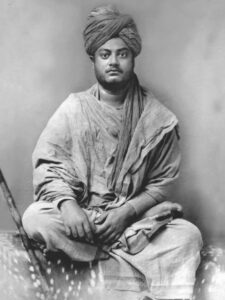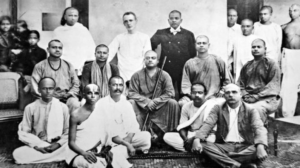Swami Vivekananda:
Popularly known as Swami Vivekanand,
Narendranath Datta was born on the 12th of January 1863. He belonged to an aristocratic, upper-middle-class family in West Bengal.
Thoughts and Ideologies:
An Indian Hindu monk and a philosopher, he was the chief disciple of an Indian mystic—Ramakrishna. He was a Hindu spiritual leader and reformer in India, who attempted to combine Indian spirituality with Western material progress. He believed that both these ideologies complemented each other. His absolute self was a person,

his own Higher Self, labouring for the benefit of humanity, and that was his noblest endeavor.
He was educated at a western-style University. His primary thought was social reform, which led him to join the Brahmo Samaj dedicated to eliminating child marriage and illiteracy. He was determined to spread education among women and lower castes, demonstrating the essential unity of all religions. He also believed in the universal and humanistic side of the Vedas, the oldest sacred texts of Hinduism. He was of the opinion that doing service to mankind is greater than just delivering and listening to religious sermons.
Spreading Hindu thoughts in the western world:
He wanted to infuse pride into Hindu thought, and he placed more emphasis on presenting Hindu spirituality to the West. He was the main force behind the movement to promote Vedanta philosophy in the United States and the UK.
Swami Vivekananda’s inspiring personality was famous throughout India and in America during the last decade of the 19th century and the first decade of the 20th century. The hitherto unknown monk of India suddenly shot into fame at the Parliament of Religions held in Chicago in 1893, at which he represented Hinduism.
He appeared in Chicago as a spokesman for Hinduism at the world’s Parliament of Religions, and so captivated the assembly that one newspaper account described him as, ‘An orator by divine right and undoubtedly the greatest figure at the parliament.’ Thereafter he lectured throughout the United States and England, making converts to the Vedanta movement.

His deep knowledge of Eastern as well as Western culture, his fervid eloquence, his brilliant conversation skills, his colorful personality, handsome figure, and sympathetic nature appeal to all sorts of Americans who came into contact with him. When people even heard Swami Vivekananda once, they always remembered him and cherished his memory.
He returned to India with a small group of Western disciples in 1897. And in India, he founded the Ramakrishna Mission at the Monastery of Belur Math on the banks of the Ganga River near Kolkata. His ideas were self-perfection and service and his established order continued to teach these values.
Contribution to the motherland:
In India, Vivekananda preached the idea of a strength-giving and men-making religion. He believed in service to man. He believed that service to man was the visible manifestation of God’s worship. He was aware of mankind, and he strove to promote peace and human brotherhood on the spiritual foundation of the Vedantic Oneness of existence. He was a mystic of the highest order. He had a direct and intuitive experience on the topic of reality.
In Swami Vivekanand’s thought—Nationalism was a prominent subject. His teachings focused towards human development as he believes that the glorious future of a country depends on its people. He strived “ to set in motion a machinery which will bring noblest ideas to the doorstep of even the poorest and the meanest.”
Just like his master Ramakrishna, Vivekanand too had the ability to soar above the world and forget himself in contemplation of the Absolute. But another part of his personality bled at the sight of human suffering. He had a short span of only 39 years and of these only 10 years were devoted to public activities and that too in the midst of much acute physical suffering.
His four famous classics are Jnana yoga, Bhakti yoga, Karma Yoga, and Raja Yoga.
All are outstanding treatises of Hindu philosophy. He also delivered innumerable lectures and wrote many inspired letters in his own hand. And today,these letters are worshipped as his sermons.
He organized the Ramakrishna Order of monks, which is the most outstanding religious organization of modern India. He dedicated this religious organization in order to promote Hindu spiritual culture, not only in India but throughout the world.
The major contribution of Vivekananda was that he raised interfaith awareness and he brought Hinduism to the status of a major world religion during the late 19th century.
He was also at the forefront of Hindu reform movements in India, and he is a propagator of nationalism in colonial India. He found the Ramakrishna Mutt under the Ramakrishna Mission.
He is best known for his speech which began with the words, “Sisters and brothers of America.” In this speech, he introduced Hinduism at the Parliament of the World Religions in Chicago.
Lectures and works of Literature:
Although a strong orator and a great writer in English and Bengali, he was not a thorough scholar. Hence most of his published works were compilation of the lectures given globally and mainly delivered impromptu. His main contribution to Raja Yoga consists of the lectures he delivered in New York.
As per Banhatti, Vivekanand was a complete artist—a singer, a painter, a wonderful master of language and a poet.
His style of poetry was of the highest order and gave a message of wisdom and betterment to the society. Few lines from one of his famous poems are as follows:
Let darkness go; the will-o’-the-wisp that leads
With blinking light to pile more gloom on gloom.
This thirst for life, forever quench ; it drags
From birth to death, and death to birth, the soul.
He conquers all who conquers self. Know this
And never yield, Sannyâsin bold! Say—
“Om Tat Sat, Om!”
He has composed many songs and poems including “Kali the mother” which is one of his favorites. His teachings were blended with humour and he used easy and understandable language. Even his writings in Bengali language displayed his belief that words should clarify ideas, rather than exhibiting the writer’s or speaker’s knowledge.
His disciples believe that his last worldly day is the day he attained mahasamadhi, also fulfilling his prophecy that he would not live for forty years.
Regarded as a patriotic saint in India, the birth anniversary of Swami Vivekananda is celebrated as National Youth Day every year.
Interested in becoming a yoga teacher?
Newsletter
Upcoming events and latest blogs